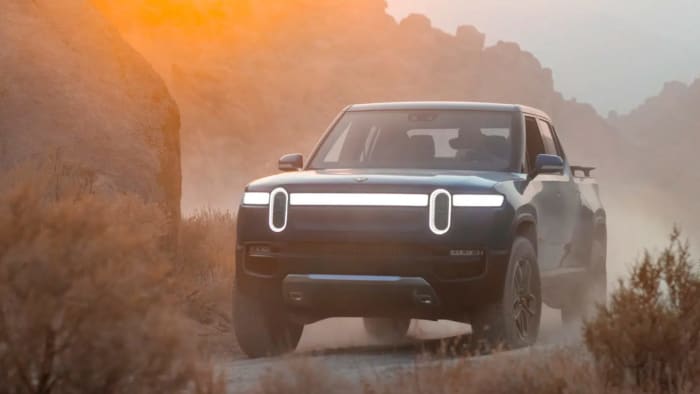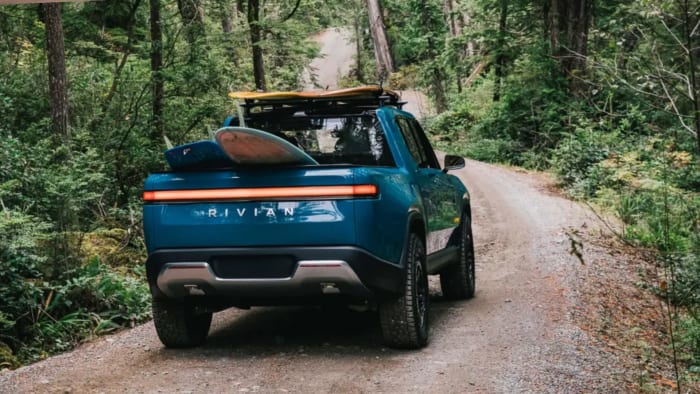It is an understatement to say that Rivian is going through a tough period.
The young electric-vehicle manufacturer has just poured cold water on investors’ hopes by announcing a pessimistic outlook for 2022. And worse, Rivian did not give the impression that it had solved its biggest problem: how to produce a lot of cars to satisfy growing demand for electric vehicles.
On the contrary, Rivian said it could produce as many as 50,000 vehicles at its site in Normal, Ill,, but would manufacture only half that number. The company, which produces three vehicles — the R1T electric pickup truck, the R1S electric SUV, and the the RCV electric commercial van — attributed this setback to supply-chain disruptions.
“I’d like to talk a bit about the R1 production ramp. This ramp is progressing well across all areas of the R1 production line, and we’re achieving demonstrated production rates that are in line with our expectations,” Chief Executive Robert Joseph “RJ” Scaringe told analysts during the fourth-quarter-earnings call on March 10.
“And with all this progress, the biggest constraints we now face really lie with the supply chain, and it’s really a small number of parts for which the supplier isn’t ramping at the same rate as our production lines are ramping up.”
New COO to Solve Supply-Chain Issues
Chief Financial Officer Claire McDonough also cited the supply chain: “We believe our normal facility, manufacturing equipment, and processes have the ability to produce approximately 50,000 vehicles across our R1 and RCV platform in 2022 if we were not constrained by our supply chain.”
McDonough underlined the impact that these difficulties would have on the group’s finances.
“We experienced higher costs due to inflation and supply-chain challenges, which resulted in increased bill of materials and higher logistics costs associated with expediting shipping of certain parts. As a result, in the fourth quarter, we generated a negative gross profit of $383 million,” McDonough said.
She added: “As we look forward to 2022, I wanted to reiterate our excitement for the opportunities ahead and continued improvement in the areas of our business that we can control.
“Our primary focus will be to ramp our normal facility and the production of our R1 and RCV platform. While we work diligently to alleviate any supply-chain challenges, we believe that through 2022, the supply chain will be the fundamental limiting factor to our total output for the year.”
Rivian shares were unsurprisingly rolled by investors. They’re down almost 78% from their high reached on Nov. 15. They ended Friday trading at $38.05. In four months, more than $118 billion in market capitalization had vanished.
To ease investor skepticism about its future, Rivian decided to make a major strategic appointment. The company is expected to announce this week that it named Frank Klein chief operating officer, according to Bloomberg.
Last week, Scaringe told analysts that Rivian would announce its next COO this week. Contacted by TheStreet Rivian declined to comment.
“Next week, we’ll be announcing our new COO that will be responsible for helping to scale our production and supply chain. We have also continued to hire great leadership across the business to keep up with our rapid scaling,” Scaringe said last week.
Klein would succeed Rod Copes, who left at the end of last year after less than two years in the position.
‘A True Car Guy’
Klein is the head of a car-making unit at Magna International, (MGA) – Get Magna International Inc. Report the Aurora, Ontario, auto-technology provider. He is president of Magna Steyr bei Magna International.
“As President of Magna Steyr, I lead a team responsible for positioning Magna as key enabler to new mobility through our unique design, engineering and complete vehicle assembly capabilities,” Klein wrote on his LinkedIn profile.
“It’s one of the most exciting times in my career as we are collaborating with established automakers, startups and even cities, as we reimagine the possibilities in the new mobility landscape.”
Before joining Magna in 2019, he worked for Daimler AG (DDAIF) for 27 years, including head of operations for the Mercedes-Benz Vans business unit and project lead to set up the Mercedes-Benz plant in Kecskemét, Hungary.
“Both on and off the job, I am a true ‘car guy,'” he said.
Klein is going to need to take that approach because Scaringe told analysts that the new COO’s main mission will be to help Rivian solve its ramp-up issues.
Rivian has already made changes to the leadership of its production activities. Klein will supervise Tim Fallon, a former Nissan (NSANF) executive. Fallon was appointed vice president of manufacturing in February. He succeeded Erik Fields, also a former Nissan executive, who left after 16 months in his post.
The company will soon start building its second production site, east of Atlanta.


